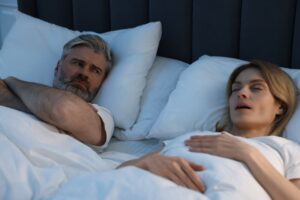Obstructive sleep apnea is one of the most common sleep-breathing disorders in the nation, estimated to impact 39 million adults in the country. While every patient may experience their condition on varying levels, it’s always important to get treated to avoid future health complications. If one of these five myths is standing in the way of you and taking your first step towards dealing with your symptoms, it’s time to look after your health. Read on to debunk five of the most common myths about sleep apnea.
#1 Snoring Means You Have Sleep Apnea
While chronic, loud snoring is one of the most noticeable and common signs of sleep apnea, snoring alone doesn’t mean that you have sleep apnea. People with sleep apnea typically also experience other symptoms, like chronic daytime fatigue, gasping for breath throughout the night, and are even at a higher risk of certain medical concerns. While snoring may be a sign of obstructive sleep apnea, just because you snore doesn’t mean that you have the condition.
#2 Sleep Apnea Only Impacts Men
Men are more commonly diagnosed with sleep apnea than women, but that doesn’t mean that women aren’t at just as high of a risk of having sleep apnea. Today, an estimated 45 percent of referrals for sleep studies are for patients who are women.
#3 The Only Sleep Apnea Treatment is CPAP Therapy
CPAP therapy is one of the most common treatments for sleep apnea, but it isn’t the only option. In fact, many patients are CPAP-intolerant, which means that they aren’t able to reap the benefits of treating their sleep apnea because the noise of the machine or face mask keeps them from being able to sleep well. In these cases, oral appliance therapy may be a more appropriate, better treatment method.
Oral appliance therapy utilizes customized mouthguard-like devices that are designed to keep the airway free of obstruction as you sleep. All that’s needed is to wear a simple, sleek oral appliance.
#4 Sleep Apnea Will Eventually Go Away on Its Own
As much as every treatment wants to believe this myth is real, it’s unfortunately true. Sleep apnea doesn’t just go away on its own. It needs to be treated in order for you to see a decline in symptoms and help improve your health and overall quality of life.
#5 Sleep Apnea Isn’t a Serious Condition
While some sleep apnea conditions may be less severe than others, they can still have a noticeable impact on your day-to-day life and health over time. From difficulty concentrating at work to a higher risk of developing serious medical concerns like high blood pressure and heart disease, sleep apnea should always be addressed.
About the Practice
Drs. John Ludu and Rhenu Sharma are two highly skilled, experienced dentists who are dedicated to helping their patients do what’s best for their oral and overall health. For those who are CPAP-intolerant, they offer a more comfortable, non-invasive alternative to treating obstructive sleep apnea, called oral appliance therapy. For questions or to schedule an appointment, visit DuPont Family Dentistry’s website or call 253-964-7000.

